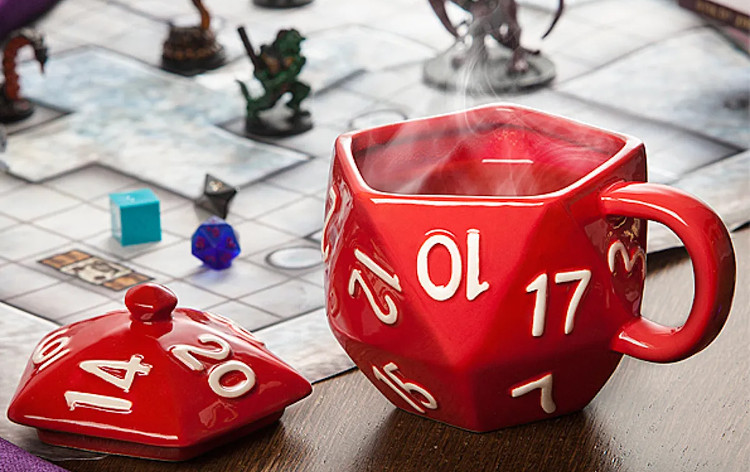Some thoughts on Total Party Kills from guest blogger Ryan Costello now that he’s been on both sides of the board for a (near) TPK.
As I mentioned in yesterday’s Keyword Design, our last Hell’s Rebel session was savage. Of the five party members, only Corey’s rogue Finnegan survived, dragging off my unconscious oracle Doreen, and leaving behind the dead bodies of Jay’s mesmerist Lani, Matt’s swashbuckler Hobbes, and Mili’s bloodrager Fidget. This after our last campaign, Rise of the Runelords, ended with a near TPK, with only Corey’s ninja surviving to flee stealthily into the sunset (I’d already let Paizo know they need to update their setting material to reflect that the Runelords won).
DEATH IN PATHFINDER
On a resent Know Direction, Alex and I were debating whether solving death is too cheap (my take) or too expensive (his take) in Pathfinder. Part of why he thought it should be cheaper was that he didn’t feel a GM should just be able to decided that a character died and then the player can’t do anything about this. I didn’t get into this then because it was tangential to the topic of the podcast, but I disagreed with the premise of his argument.
A GM doesn’t choose to kill a character, at least not in my experience. Like most matters of consequence in the game, PC death is a combination of player and GM decisions at the build and roleplay level, as well as mitigated chance, but that goes back to the build decisions a player makes. It’s part of the freeform linear storytelling experience that I love about roleplaying. Death doesn’t happen often in my games, and no one is happy when it does, but its value as a motivator and the dramatic significance it holds are too important to just make it something that I feel should be easily solved.
That said, I think there is room in the game for a consequence of failure less than death, and that applies to NPCs as well. PCs are nicknamed murder hobos because any given PC kills A LOT, including sentient creatures. The default conflict does not need to be life or death.
TOTAL PARTY KILLS
I’m cheating when I say that I’ve had any TPK experiences, because someone (Corey) has survived both encounters that took down the rest of the party. Still, I count them both because the Runelords TPK ended the campaign, and the Hell’s Rebels TPK has significantly impacted the campaign.
There was a pattern to both TPKs that I hope we can learn from:
- The party engages the enemy as usual;
- A PC drops, splitting the party’s focus between keeping them alive and continuing to engage;
- An area effect significantly impacts the surviving party members;
- Another PC drops;
- Group dynamics are thrown off by the missing party members and the surviving party members find they are gradually less effective, but we cling to the hope that we can still defeat the enemy;
- Everyone’s down but Corey’s character, who flees.
We’ve had encounters where a character drops without it leading to a TPK. Jeff had a string of wizard PCs die in RotRL (he lost three characters in all that campaign). However, we’ve never lost two characters in one combat without it leading to a TPK. I’m counting unconscious characters as lost in this case. Even if they’re stable, reviving them is such an incremental process that everyone is better off focusing on winning combat and then dealing with them. The exception being the healer. In Hell’s Rebels, when Doreen went down, hope took a hit.
Also of note, we’ve never had a TPK in a homebrew, only in published adventures. Published adventures have been deadlier for us overall. It’s actually something I like about them. As a GM, I know my comfort zones, and my players –whether intentionally or not- build characters better at overcoming my preferred challenges and weak against tactics I don’t tend to use (casters, for example).
TPK AS A GM
In general as I GM I like to animate moments. If a full attack misses/misses/hits, I talk about how the target mocks the wasted effort of the attacker’s best efforts only for them both to be surprised that the last ditch effort connects. One of my favourite descriptions was when an unarmed monk’s flurry of blows scored a critical hit and I acted out them grabbing a clavicle in each hand and ripping the target in two. It turns combats into scenes, and makes the same actions that the PCs taken in every encounter seem unique.
One of the hard parts of GMing a TPK is that I either gradually animate the encounter less or I bring extra attention to the PCs impending deaths. Both TPKs I’ve been involved in have a somber tone, and not animating them flattens the emotional peaks. We just settle into an uncomfortable quietness. Conversely, animating anything would vary the tone, but unless the PCs mount a comeback, it just emphasizes their doom. Looking back, maybe that would have encouraged the party to accept that all hope was lost and to flee with a few survivors instead of fighting to the last adventurer.
TPK AS A PLAYER
This was harder than GMing a TPK, largely because I felt responsible. I wanted to take a diplomatic approach to a confrontation, so we bought a few supplies to meet that end, including a book about the race. I entered a hostile environment with only Fidget so I was protected but left the rest of the party behind so our opponents didn’t feel threatened. We told the sentries we met that we wanted to negotiate with their leader. The leader arrived with every able bodied guard in the area and attacked us.
This was part one of why I felt guilty. Even as Jeff was bringing in more NPCs, I didn’t interrupt to alert the rest of the party or even consider how quickly negotiations could go down. The party was just out of view but I still split the party and didn’t explicitly plan for how to alert them that it was time to join in. Also, my plan meant that instead of gradually fighting these 13 foes over multiple smaller encounters, we fought them all at once. I don’t blame the GM because this was in reaction to my actions as a player and was logically consistent with the world.
As combat went on, we thought we were doing well. We dropped a guard or two a round. Meanwhile, the leader that I’d summoned sat back and cast defensive spells, which I kept identifying. I scoffed that his defensive spells were proof that he was more afraid of us than we were of him. We were about five rounds in when the now very well defended caster turned on the offense. Doreen’s meager AC came to light. I was a 6th level character with 11 AC (14 with a buff) because I the total damage I’d taken all campaign was not as high as my current hp. This character’s first feat was Godless Healing, which allowed me to heal 1d8+HD as a move action once per day but only when below half my total hp. I hadn’t used that feat once before this encounter. I had by the time I was knocked unconscious, but I still had so many unused resources left in my unconscious body.
This was part two of why I felt guilty. AC aside, I was the most survivable PC in the ground and yet I fell unconscious. I got to spend so much of the encounter looking at my character sheet thinking of what I could have done with those available 3rd level spell slots. Had I summoned my brother’s skeleton early on (it’s an oracle of bones thing. Well, really it’s a Doreen thing), maybe a few of those defensive spells would have needed a Concentration check. Maybe a few NPCs would have split their attention when we needed it.
Guilt part three is survivor’s guilt. I managed an 18 on the die when I needed a 17+ to stabilize while unconscious while the rest of the group bled out or their bodies got caught in area of effect spells. Corey didn’t save me because of any deeper connection between our characters. I was the only member of the party alive to save.
CONCLUSION
Like I said, this was a great defeat but not as total as a TPK is by definition. Hell’s Rebels will continue, and I’ll be able to channel my guilt into how I play Doreen. There was no going back to Rise of the Runelords without it feeling like there was a second set of high level adventurers who probably should have been helping the first party all along.
How do my TPK experiences compare to yours, either as a player or a GM? As a player, how do you prefer a GM handle TPKs? As a GM, what would you do in a TPK-likely scenario?







One thing is miss about playing superhero RPGs is that there was an expectation that some reasonable percentage of the time the villains would knock all the heroes unconscious and either get away, or take the heroes captive, perhaps to put them in a deathtrap of some kind.
In some ways, its frustrating that Pathfinder is designed to be too easy, since failure is so much more significant and plot destroying than in other genres.
*One thing I miss… (sorry)
Me and my big mouth. Yesterday, I just experienced my first TPK in five years of playing PFS. I’m okay with it, personally I found it refreshing, but I feel bad for one of the players at the table that does need to count the character as dead and start a new first level character.
Sorry Bardwannabe, I thought I replied to your last comment.
I’ve never heard Pathfinder described as being designed to be too easy but that’s an accurate description for it. If the majority of meaningful encounters are life or death and death ends the game, the default assumption has to be that you either win most of the time or you accept that stories will be short and often go unfulfilled.